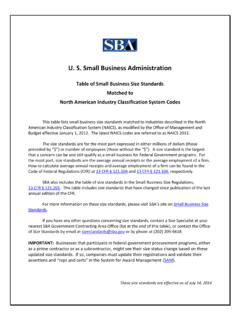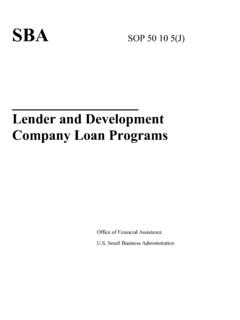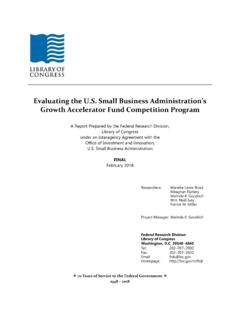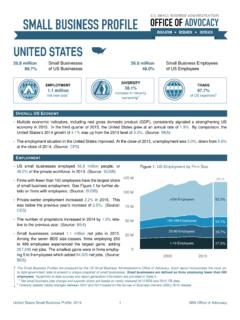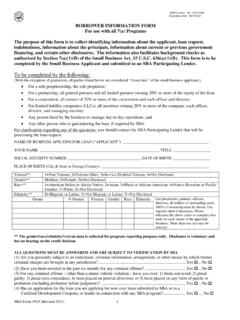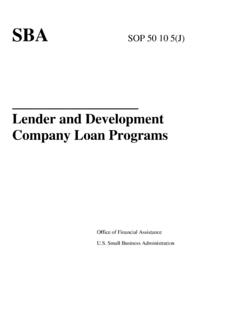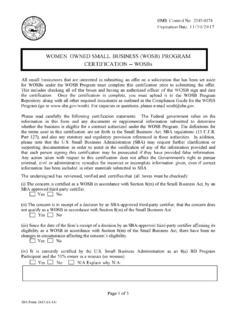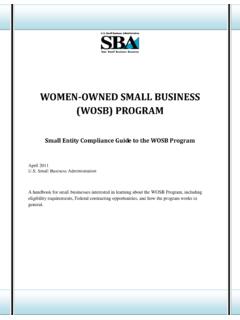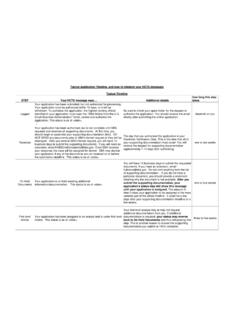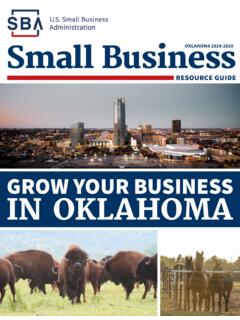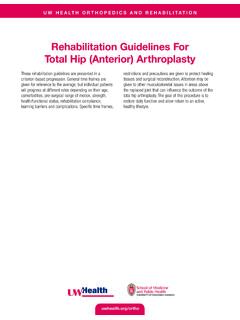Transcription of Faith-Based Organizations FAQ
1 4/3/2020 11:25 PM 1 | P a g e Faith-Based Organizations FAQ FREQUENTLY ASKED QUESTIONS REGARDING PARTICIPATION OF Faith-Based Organizations IN THE PAYCHECK PROTECTION PROGRAM (PPP) AND THE ECONOMIC INJURY DISASTER LOAN PROGRAM (EIDL) 1. Are Faith-Based Organizations , including houses of worship, eligible to receive SBA loans under the PPP and EIDL programs? Yes, and we additionally clarify that Faith-Based Organizations are eligible to receive SBA loans regardless of whether they provide secular social services. That is, no otherwise eligible organization will be disqualified from receiving a loan because of the religious nature, religious identity, or religious speech of the organization. The requirements in certain SBA regulations 13 (k) and (g) impermissibly exclude some religious entities. Because those regulations bar the participation of a class of potential recipients based solely on their religious status, SBA will decline to enforce these subsections and will propose amendments to conform those regulations to the Constitution.
2 Although 13 (a) states that nonprofit entities are ineligible for SBA business loans (which includes the PPP program), the CARES Act explicitly makes nonprofit entities eligible for the PPP program and it does so without regard to whether nonprofit entities provide secular social services. 2. Are there any limitations on how Faith-Based Organizations can use the PPP and EIDL loan money they receive? Only the same limitations that apply to all other recipients of these loans (such as that loan forgiveness will cover non-payroll costs only to a maximum of 25% of the total loan to a recipient). The PPP and EIDL loan programs are neutral, generally applicable loan programs that provide support for nonprofit Organizations without regard to whether they are religious or secular. The CARES Act has provided those program funds as part of the efforts to respond to the economic dislocation threatened by the COVID-19 public health emergency.
3 Under these circumstances, the Establishment Clause does not place any additional restrictions on how Faith-Based Organizations may use the loan proceeds received through either the PPP or the EIDL loan program. See, , Religious Restrictions on Capital Financing for Historically Black Colleges and Universities, 43 Op. __, *7 15 (Aug. 15, 2019); Authority of FEMA to Provide Disaster Assistance to Seattle Hebrew Academy, 26 Op. 114, 122 32 (2002). In addition, the CARES Act does not impose unique burdens or limitations on Faith-Based Faith-Based Organizations FAQ 4/3/2020 11:25 PM 2 | P a g e Organizations . In particular, loans under the program can be used to pay the salaries of ministers and other staff engaged in the religious mission of institutions. 3. How will churches qualify if have not been informed of tax-exempt status by the IRS?
4 Do Organizations have to request and receive tax exempt status or just meet the requirements of 501(c)(3) status to be eligible? Churches (including temples, mosques, synagogues, and other houses of worship), integrated auxiliaries of churches, and conventions or associations of churches qualify for PPP and EIDL loans as long as they meet the requirements of Section 501(c)(3) of the Internal Revenue Code, and all other PPP and EIDL requirements. Such Organizations are not required to apply to the IRS to receive tax-exempt status. See 26 508(c)(1)(A). 4. Will my organization be sacrificing its autonomy or its First Amendment or statutory rights if it requests and receives a loan? No. Receipt of a loan through any SBA program does not (1) limit the authority of religious Organizations to define the standards, responsibilities, and duties of membership; (2) limit the freedom of religious Organizations to select individuals to perform work connected to that organization s religious exercise; nor (3) constitute waiver of any rights under federal law, including rights protecting religious autonomy and exercise under the Religious Freedom Restoration Act of 1993 (RFRA), 42 2000b et seq.
5 , Section 702 of the Civil Rights Act of 1964, 42 2000e-1(a), or the First Amendment. Simply put, a Faith-Based organization that receives a loan will retain its independence, autonomy, right of expression, religious character, and authority over its governance, and no Faith-Based organization will be excluded from receiving funding because leadership with, membership in, or employment by that organization is limited to persons who share its religious faith and practice. 5. What legal requirements will be imposed on my organization as a result of our receipt of this Federal financial assistance? Will those requirements cease to apply when the loan is either repaid in full or forgiven? Receipt of a loan through any SBA program constitutes Federal financial assistance and carries with it the application of certain nondiscrimination obligations.
6 Any legal obligations that you incur through your receipt of this loan are not permanent, and once the loan is paid or forgiven, those nondiscrimination obligations will no longer apply. Faith-Based Organizations FAQ 4/3/2020 11:25 PM 3 | P a g e Consistent with certain federal nondiscrimination laws, SBA regulations provide that the recipient may not discriminate on the basis of race, color, religion, sex, handicap, age, or national origin with regard to goods, services, or accommodations offered. 13 (a). But SBA regulations also make clear that these nondiscrimination requirements do not limit a Faith-Based entity s autonomy with respect to membership or employment decisions connected to its religious exercise. 13 CFR (h). And as discussed in Question 4, SBA recognizes the various protections for religious freedom enshrined in the Constitution and federal law that are not altered or waived by receipt of Federal financial assistance.
7 SBA therefore clarifies that its regulations apply with respect to goods, services, or accommodations offered generally to the public by recipients of these loans, but not to a Faith-Based organization s ministry activities within its own faith community. For example, SBA s regulations will require a Faith-Based organization that operates a restaurant or thrift store open to the public to serve the public without regard to the protected traits listed above. But SBA s regulations do not apply to limit a Faith-Based organization s ability to distribute food or clothing exclusively to its own members or co-religionists. Indeed, SBA will not apply its nondiscrimination regulations in a way that imposes substantial burdens on the religious exercise of Faith-Based loan recipients, such as by applying those regulations to the performance of church ordinances, sacraments, or religious practices, unless such application is the least restrictive means of furthering a compelling governmental interest.
8 Congress enacted the CARES Act to afford swift and sweeping stopgap relief to Americans who might otherwise lose their jobs or businesses because of the economic hardships wrought by the response to the COVID-19 public health emergency, and SBA has a compelling interest in fulfilling that mandate to provide assistance broadly. 6. Is my Faith-Based organization disqualified from any SBA loan programs because it is affiliated with other Faith-Based Organizations , such as a local diocese? Not necessarily. Under SBA s regulations, an affiliation may arise among entities in various ways, including from common ownership, common management, or identity of interest. 13 and These regulations are applicable to applicants for PPP loans. (They also apply to the EIDL program when determining certain loan terms, although aggregating the number of employees of affiliated Organizations does not affect eligibility for EIDL loans.)
9 Some Faith-Based Organizations likely would qualify as affiliated with other entities under the applicable affiliation rules. Entities that are affiliated according to SBA s affiliation rules must add up their employee numbers in determining whether they have 500 or fewer employees. But regulations must be applied consistent with constitutional and statutory religious freedom protections. If the connection between your organization and another entity that would constitute an affiliation is based on a religious teaching or belief or is otherwise a part of the Faith-Based Organizations FAQ 4/3/2020 11:25 PM 4 | P a g e exercise of religion, your organization qualifies for an exemption from the affiliation rules. For example, if your Faith-Based organization affiliates with another organization because of your organization s religious beliefs about church authority or internal constitution, or because the legal, financial, or other structural relationships between your organization and other Organizations reflect an expression of such beliefs, your organization would qualify for the exemption.
10 If, however, your Faith-Based organization is affiliated with other Organizations solely for non-religious reasons, such as administrative convenience, then your organization would be subject to the affiliation rules. SBA will not assess, and will not permit participating lenders to assess, the reasonableness of the Faith-Based organization s good-faith determination that this exception applies. 7. Does my Faith-Based organization need to apply for this exemption or include any documentation of its religious beliefs or practices to fall within this affiliation exemption? No specific process or detailed filing is necessary to claim the benefit of this exemption. If you believe that your organization qualifies for this exemption to the affiliation rules, you should submit with your loan application a separate sheet stating as much.
